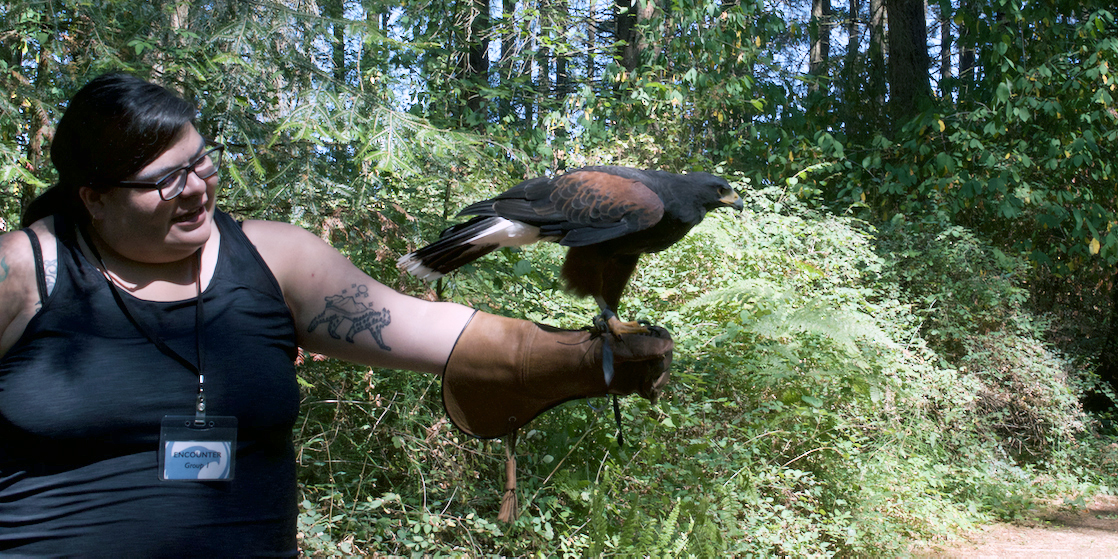After 15 years working in IT, Cindy wanted a new career, but it wasn’t until she visited a wildlife rescue centre while on vacation that she knew what it would likely be.
“I had the best day seeing birds of prey that had been injured and nursed back to health, and I remember thinking I would love to work with a wildlife rescue centre in some capacity, so I made the decision to be a vet.”
But with a plan to study animal health in the University of Alberta Faculty of Agricultural, Life & Environmental Sciences (ALES), she also knew taking a science-based degree meant tackling university math courses—never an easy subject for her, even with one University of Alberta degree already under her belt, and a lot tougher 20 years after graduating from high school.
“Math doesn’t come easily to me, and I’m pretty rusty.”
To give herself the best shot possible, Cindy enrolled in the Transition Year Program (TYP), a one-year open studies program that prepares First Nations, Métis and Inuit students for admission into one of nine U of A faculties, including ALES.
And thanks to a $130,000 donation to TYP from EPCOR, she’s having an easier time of it, taking part in new small, learning-friendly seminars and online refresher courses, made possible by the corporation’s generosity.
Helping students gain a foothold
The funding boosts support for Indigenous students who want to enter university for degrees focused on science, technology, engineering or mathematics (STEM) but may feel overwhelmed by keeping up in large, first-year lecture-based classes.
Used to hire teaching assistants, instructors and tutors for seminars capped at 35 people, EPCOR’s donation helps TYP students like Cindy get a foothold on the complex first-year math and statistics courses they’ll need to be successful, said Suzanne Butler, associate director of TYP.
“In a sea of 300 students, midterm and final exams are heavily weighed, so students only get one chance to demonstrate their knowledge within the course, and that can be a high-pressure atmosphere.”
The seminars give the students more engagement with instructors and the ability to ask questions and get help when they’re struggling with their studies.
The smaller class also lets them meet other Indigenous students in STEM programs, said Butler, noting that many come from small or rural communities.
“That helps them support one another and forms a sense of community on campus.”
EPCOR’s contribution also supported summer primer courses in high-school math and statistics for Indigenous students, which were designed by the U of A’s Department of Mathematical and Statistical Sciences to go online after COVID-19 struck.
Cindy found the primers helpful in getting back up to speed on concepts like calculus and algebra.
“It’s a good refresher for people who’ve forgotten the finer points of math and it’s good for anyone who isn’t confident in those skills. If I have issues I can reach out to an education co-ordinator for assistance. I was stuck a few times so I reached out and asked for help.”
EPCOR’s funding also provides more one-on-one tutoring generally through the U of A’s First Peoples’ House for First Nations, Métis and Inuit students who want assistance with their studies in STEM subjects like math, biology and chemistry.
Breaking down barriers to new careers
Having such corporate support helps break down the barriers for Indigenous students wanting to break into STEM-based careers, Butler noted.
“Indigenous students and graduates are so under-represented in fields like science, engineering and nursing, and industry wants to hire Indigenous graduates, so we need to help them successfully complete these degree programs. EPCOR’s contribution is a great step in doing that.”
EPCOR contributed to the TYP program because it helps set youth up for success, said Stuart Lee, president and CEO.
“TYP really caught our attention because of the wrap-around support it provides students who need added support meeting faculty entrance requirements,” he said.
Initiatives like TYP also strengthen the workforce of tomorrow for corporations like EPCOR in terms of diversity and STEM knowledge, Lee added.
“Our future success depends on having a diverse and well-educated workforce, and science and engineering are key elements of what we do. We want to play an active role in helping to make sure those fields are as diverse as the communities we serve. This means removing barriers and having pathways in place for students to build their careers.”
As a mature student, Cindy feels like she’s now ready to tackle her STEM studies on an equal level with her newly minted classmates fresh from high school.
“I’m very happy that the TYP program and the primers helped me get an even footing and I’m excited about the possibility and the opportunity to be able to do this. It’s been really great to see that there are people who want to see you succeed. I actually see a future as opposed to settling for a more humdrum lot in life.”
